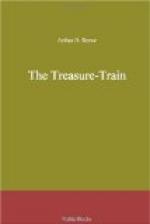“Wet them!” he cried, as he fitted his own over his nose and staggered to a water-cooler.
“What is it?” I gasped, hoarsely, as we all imitated his every action.
“Chlorin gas,” he rasped back, “the same gas that overcame Granville Barnes. These masks are impregnated with a glycerin solution of sodium phosphate. It was chlorin that destroyed the red coloring matter in Barnes’s blood. No wonder, when this action of just a whiff of it on us is so rapid. Even a short time longer and death would follow. It destroys without the possibility of reconstitution, and it leaves a dangerous deposit of albumin. How do you feel?”
“All right,” I lied.
We looked out again. The things that looked like fuses were not bombs, as I had expected, but big reinforced bottles of gas compressed at high pressure, with the taps open. The supply was not inexhaustible. In fact, it was decidedly limited. But it seemed to have been calculated to a nicety to do the work. Only the panting of the locomotive now broke the stillness as Kennedy and I moved forward along the track.
Crack! rang out a shot.
“Get on the other side of the train—quick!” ordered Craig.
In the shadow, aside from the direction in which the wind was wafting the gas, we could now just barely discern a heavy but powerful motor-truck and figures moving about it. As I peered out from the shelter of the train, I realized what it all meant. The truck, which had probably conveyed the gas-tanks from the rendezvous where they had been collected, was there now to convey to some dark wharf what of the treasure could be seized. There the stolen yacht was waiting to carry it off.
“Don’t move—don’t fire,” cautioned Kennedy. “Perhaps they will think it was only a shadow they saw. Let them act first. They must. They haven’t any too much time. Let them get impatient.”
For some minutes we waited.
Sure enough, separated widely, but converging toward the treasure-train at last, we could see several dark figures making their way from the road across a strip of field and over the rails. I made a move with my gun.
“Don’t,” whispered Kennedy. “Let them get together.”
His ruse was clever. Evidently they thought that it had been indeed a wraith at which they had fired. Swiftly now they hurried to the nearest of the gold-laden cars. We could hear them, breaking in where the guards had either been rendered unconscious or had fled.
I looked around at Maude Euston. She was the calmest of us all as she whispered:
“They are in the car. Can’t we do something?”
“Lane,” whispered Kennedy, “crawl through under the trucks with me. Walter, and you, Dugan,” he added, to the guard, “go down the other side. We must rush them—in the car.”
As Kennedy crawled under the train again I saw Maude Euston follow Lane closely.




